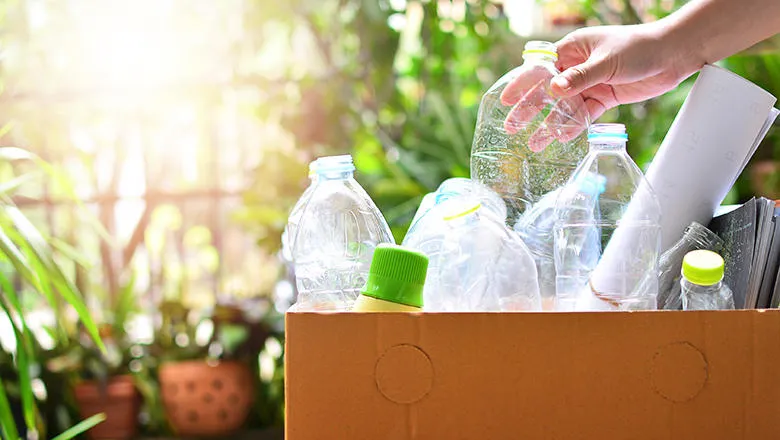By integrating biochemistry into day-to-day recycling the new work hopes to make plastics more sustainable.

A new approach to breaking down waste materials from the food and drink industry and improve the sustainability of plastics will be developed by Dr Alex Brogan, in a project led by Imperial College London.
Funded by the Engineering and Physical Sciences Research Council and Biotechnology and Biological Sciences Research Council, a total of six million pounds has been awarded to five multidisciplinary three-year projects, each aiming to address the damaging environmental impact of plastic.
The world produces around 350 million tonnes of plastic a year, with the UK using around five million tonnes a year and throwing away 100 billion pieces of plastic packaging. It's believed that only 12% of UK plastic waste is recycled within country, with the rest either incinerated, put in landfill or exported overseas for recycling.
The abundance of plastic waste on the planet has caused a number of problems, with nearly 700 species of animal known to have been negatively affected by plastics, causing death through entanglement, starvation or organ damage. Some estimates suggest that plastics accounted for 4.5% of global greenhouse gas emissions in 2015, and are a growing contributor to global warming.
The accumulation of plastic waste in the environment is an ecological disaster. This project will help close the loop between the production of new materials and the recycling of old ones for some of the hardest materials to recycle with current methods."
Dr Alex Brogan, Department of Chemistry
To help reduce levels of plastic waste and emissions from new plastic production, 'A New Approach to Recycling Multilayer Packaging', will look to integrate biochemical techniques into everyday recycling methods to break down multilayer packaging.
Typically made from plastic, paper and aluminium bonded together, multilayer packaging ensures that products are well protected in transit and maintain their freshness. As a result, it is increasingly being adopted by the food and drink industry. This however comes at a price. Currently, adequate technology to recycle this type of packaging doesn't exist, meaning avenues to deal with it sustainably are limited.
Through a combination of mechanical, chemical and biochemical recycling technologies, the project will design a recycling platform that can separate and recover the constituent building blocks of plastic alongside other materials in the original packaging. By taking these recycled elements and using them to produce new plastic packaging, new, high-quality materials can be produced without the associated carbon footprint of making new plastics from oil. This is referred to as a circular economy.
We can establish a circular economy that means these materials will be able to be manufactured from recovered resources instead of oil-based commodities, with less of a burden on landfill and the environment."
Dr Alex Brogan, Department of Chemistry
As Dr Alex Brogan explains, "The accumulation of plastic waste in the environment is an ecological disaster, and a circular economy is going to be vital if we're to change that. This project will help close the loop between the production of new materials and the recycling of old ones for some of the hardest materials to recycle with current methods.
"My role in this project will be primarily biochemical, changing the conditions of biological catalysts, or enzymes, to break down the molecular structure of this plastic packaging into its base materials. By doing this, we can establish a circular economy that means these materials will be able to be manufactured from recovered resources instead of oil-based commodities, with less of a burden on landfill and the environment."
Whilst the focus of this project is on multilayer packaging, the methodology developed by Dr Alex and the teams at King's and Imperial will be also be able to be applied to other forms of waste, including mixed waste streams.
Mixed waste streams, or un-sorted waste, has traditionally posed a large barrier to recycling as individuals put all of their rubbish into a singular bin instead of sorting it into separate groups. By developing a recycling platform that can split waste into its constituent parts, this work will help reduce strict requirements around waste separation and make recycling simpler for individuals.







